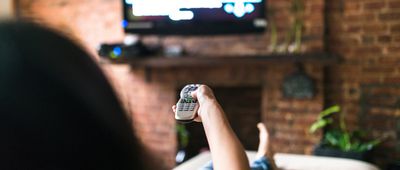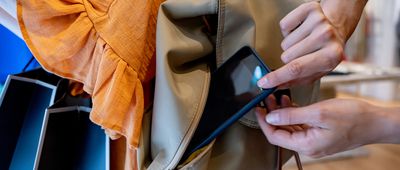There’s no escaping blue light. The sun, lightbulbs, TVs, smartphones, and this very screen emit the short wavelength light, which explains why blue light glasses have surged in popularity in the past few years. But do blue light glasses work, or are they a waste of money? The short answer is: It depends. We wanted to dig deeper, so we asked ophthalmologists, optometrists, and other blue light experts to find out what the hype is all about.
What Is Blue Light?
We can see a range of colors along the visible light spectrum, all of which are measured in wavelengths. On the short end, we have violet and blue, while red and yellow are longer wavelength colors. So when people refer to blue light, they’re quite literally talking about blue-colored or -tinged visible light.
What Are Blue Light Glasses?
Blue light glasses are equipped with clear or orange-tinted lenses that block blue light. While their popularity has steadily risen since 2016, they became especially sought-after during the pandemic, when many people were stuck at home in front of a computer screen. They come in a variety of colors, styles, and price points, and can also be fitted with prescription lenses.
Do Blue Light Glasses Work?
Before we answer that question, it’s helpful to divide claims about blue light glasses into three categories: sleep quality, eyestrain, and eye health.
I’m so glad I got blue light glasses so now it’s actually super healthy that I’m on my phone 9 hours a day
— Paul McCallion (@OrangePaulp) January 14, 2021
Sleep Quality
Dagny Zhu, an ophthalmologist and eye surgeon, told Cheapism that blue light disrupts sleep because it prevents your body from producing melatonin, a sleep hormone that helps regulate your circadian rhythm.
The scientific evidence behind that research, Zhu added, is stronger than other claims about blue light’s harmful effects. For instance, a recent review of 24 studies on blue-light-blocking glasses and sleep found that there “was substantial evidence” that the glasses helped with various sleep disorders and disruptions.
This comes with a huge caveat, however. Both Zhu and neuro-ophthalmologist Bradley Katz noted that there are countless brands and loose regulations, making it difficult for consumers to find the best blue light glasses.
“In testing, blue light glasses haven't been found to block much blue light,” Katz told Cheapism. “They vary widely from brand to brand, and unless you have a spectrometer to test them, it's impossible to know what you're really getting.”
Nevertheless, Zhu said there’s “no harm” in trying blue light glasses to improve sleep, especially since “some patients do feel a subjective improvement in sleep quality.”
@dr.ranywoo Fact or cap: Blue light edition 👓 Comment if you’ve used blue light glasses before! #ophthalmology #doctor #bluelight #glasses #factorcap ♬ Ride It - Regard
Eyestrain
Compared to claims about sleep quality, there’s far less evidence that blue light glasses prevent eyestrain, with Zhu calling the data “mixed.” Instead, eyestrain is usually caused by a lack of blinking, according to the American Academy of Ophthalmology.
“These effects are caused by how people use their screens, not by anything coming from the screens,” Katz explained. “The best way to avoid eyestrain is to take breaks from the screen frequently.”
The 20-20-20 rule is a popular shorthand to remember to take breaks. For every 20 minutes of digital screen time, you should look at something 20 feet away for 20 seconds.
Eye Health
Experts say that blue light can be harmful in large doses over time.
“Blue wavelengths are known to cause oxidative damage to retinal cells, and a lifetime of exposure does appear to contribute to cataract formation and the development of macular degeneration,” said Benjamin Ticho, an ophthalmologist and associate professor at the University of Illinois.
But that doesn’t mean we should panic and throw out all our digital devices, as our eye’s natural lens blocks most harmful blue and ultraviolet rays. Plus, Ticho explained that the amount of blue light exposure from a sunny blue sky far outweighs what we might experience from, say, a day-long video game binge.
As for the blue light our eyes do absorb, the glasses don’t seem to do much, according to Zhu, who said that “there has never been scientific data showing that blue-light-blocking glasses protect eye health.”
Katz also highlighted the lack of good data.
“First, let me say that studies into the potential harm caused by blue light haven’t been too conclusive, with mixed results thus far,” Katz explained. “In fact, the American Academy of Ophthalmology recognizes digital eyestrain, but stops short of asserting that blue light causes eye damage or adversely affects eye health.”
The Bottom Line
Blue light glasses may be effective if you’re trying to improve your sleep. But even then, it’s hard to know if a pair of blue-light-blocking glasses actually work because of the lack of regulations and standardizations.
Instead, you can opt for two proven, free solutions: take breaks and reduce your screen time before bed.
Frequently Asked Questions
What are blue light glasses?
Blue light glasses block blue light from entering your eyes, though it’s difficult to say how effective they are because of the many brands and lack of regulations.
Do blue light glasses work?
Wearing blue light glasses may improve your sleep quality. Other marketing claims (preventing eyestrain, promoting eye health, etc.) are dubious, however.
Are blue light glasses worth it?
If you’d like to improve sleep quality and often stare at a digital screen before bed, then blue light glasses may be worth it. However, there’s a much cheaper and more effective way to reduce blue light: just avoid looking at a screen at least an hour before bed.
What are the best blue light glasses?
You can’t really test blue light glasses without an expensive spectrometer, and the market remains largely unregulated. Your best bet? Buy a cheap pair with a good return policy and see if you notice a difference. A recent study in Optometry and Vision Science found no difference between price and light-filtering efficiency.








